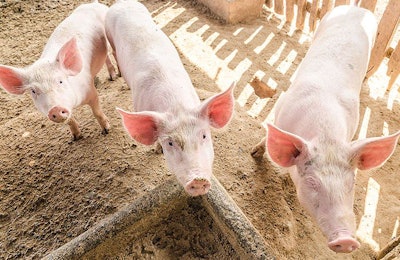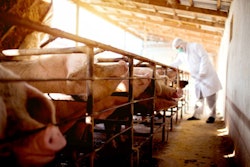
High-level discussions in Italy have resulted in funding to help protect the nation’s pork industry from the adverse effects of African swine fever.
Several measures have been agreed recently by the Italian government to control the spread of African swine fever (ASF), and to address the impacts on the nation’s pig sector.
According to the Ministry of Agricultural, Food and Forestry Policies, progress was made regarding structures and regulations to manage law enforcement actions. Furthermore, there will be more support for companies affected by the disease.
In January, the health ministry announced a series of measures to contain and eradicate disease in the areas where cases have been confirmed. So far, this applies to wild boar in the northwestern regions of Piedmont and Liguria.
Also covered by the agreement is the appointment of an extraordinary commissioner to oversee the necessary actions across affected regions. The position also brings responsibility for a budget of EUR35 million (US$40.1 million). This sum will come out of a EUR50 million budget recently allocated by the government for ASF surveillance, as well as support for businesses involved in the supply chain.
In the meantime, discussions continue between the president, ministers and industry organizations on further actions related to disease control and market support.
Agricultural producers’ confederation, Copagri, has called for continued monitoring of the situation, reported Agricultura. The organization also wants new technologies to be adopted for reporting new cases of ASF, and for information exchange. To reduce the spread of the virus, it has suggested the construction of a double fence to control wild boar movements, and a reduction in their population.
This week, the same source has reported comments from the confederation of Italian agriculture. The ASF situation in Italy is very worrying and out of control, according to the president of the organization’s branch in Tuscany.
Further ASF cases detected in Italian wild boar
The latest official notification of ASF cases in Italy outlines 12 new cases. According to the report to the World Organisation for Animal Health (OIE), 10 of these animals were found in the province of Genoa in Liguria, and the other two in Alessandria, which is in the Piedmont region.
These cases were confirmed in the period January 20-25. They bring to 27 the number of ASF cases in northern Italy since early January. All cases so far have been in wild boar, and in the same two provinces.
On the Italian island of Sardinia, ASF has become endemic among wild and feral pigs.
ASF situation elsewhere among Europe’s wild boar
So far this year, 1,043 outbreaks among wild boar have occurred in Europe. This is according to the Animal Disease Information Notification System administered by the European Commission (EC; as of January 30). Cases have been registered through this system by 11 countries.
Recording the most outbreaks has been Poland (354), followed by Bulgaria and Germany (each with 151) and Romania (114). Also registering cases during January were Bulgaria, Estonia, Hungary, Italy, Latvia, Lithuania, Slovakia and Ukraine.
In Germany, the total number of ASF cases in wild boar has risen to 3,309. This figure covers all cases in the wild population since the first case in September 2020.
This total comprises 2,388 in the eastern state of Brandenburg (as of February 2), 911 in neighboring Saxony (as of January 31), and 10 in Mecklenburg-West Pomerania. All three states are in the east of Germany, and border Poland.
Over the past two weeks, Ukraine’s veterinary authority has registered two new ASF outbreaks in wild boar, affecting three animals. According to the official reports, the cases were discovered in the neighboring northern oblasts of Kiev and Chernihiv. ASF had been absent from Kiev since June 2021, while there had been no reported cases in Chernihiv for almost two years.
Also over this period, the authorities have declared to the OIE that the ASF situation has been “resolved” in Chernivtsi. In this western region, three cases were reported between early November and mid-December last year.
In the Republic of North Ossetia-Alania, the first animals have tested positive for the ASF virus for more than eight years. According to the official OIE report, affected were four animals found dead at one location during January. The Republic is part of Russia’s North Caucasus federal district.
4 nations report new ASF cases in domestic pigs
Up to January 30, four European nations have confirmed ASF outbreaks among domestic swine through the EC’s system.
Of the total of 46 outbreaks for the year so far, Romania accounts for 42. Also reporting outbreaks have been Bulgaria (2), and one in each of North Macedonia and Slovakia.
One month ago, North Macedonia registered its first ever cases of ASF.
Over the past two weeks, Romania’s veterinary authority has registered 12 new outbreaks in domestic swine with the OIE. One of these involved a farm with just over 7,300 pigs in the southeast of the country. Ten of the other outbreaks affected small backyard herds, while the remaining outbreak was in a single infected pig carcass found discarded in a public place.
In the southwest Bulgarian province of Blagoevgrad, ASF was detected at two locations for the first time in more than two years. In mid-January, one dead pig was discovered in a village in the province. Around two weeks later, a backyard herd of five pigs tested positive for the virus after one of the animals died.
After a brief hiatus, ASF has been detected again in Riscani in Moldova. According to the official report to the OIE, around half of the 143 pigs at a farm there died in mid-January. Located in the northwest of the country, the district borders Romania.
Earlier in January, Moldova reported its first ASF outbreak of this year. That was in another district in the far northwest of the country.
The first ever cases of ASF have been detected in the Republic of Bashkortostan, according to a recent OIE report from Russia’s animal health agency. Affected was a backyard herd of 35 pigs, 12 of which died. The rest have been destroyed. Bashkortostan is part of the Volga federal district in western Russia.
View our continuing coverage of the global African swine fever situation.
















